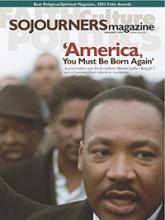Matthew, Luke, and John tell us the story of Jesus in their own words, firmly linking him to the Hebrew Testament through scripture and events. The accounts confirm Jesus’ heritage as the true king, the one who will "judge your people with righteousness and your poor with justice" (Psalm 72:2). For Matthew, Jesus is a liberator in the line of Moses (Matthew 2:1-12). Luke assures us that Jesus is the Messiah, the one who is so passionately awaited in Jewish scriptures (Luke 4:18). John insists that Jesus is both flesh and sign; he is the one who transforms ordinary substances into sacrament, so that we may know and taste God’s presence in the world (John 2:11).
They remind us that Jesus is no ordinary king, for his primary concern is for those who, in the world’s eyes, have nothing and are nothing. They are "the oppressed," "the poor," "the needy," "the blind, "the captives," "the weak," and "those who have no helper." Jesus is king of the downtrodden, and he calls us, as his living body, to be the same.
It is Paul who insists that as Christians we be a body—individuals who are equal, treated with mutual respect, and united (1 Corinthians 12:13). Living as one body does not come without difficulties, but Paul reminds us that we bear the Spirit for one purpose only, "the common good" (1 Corinthians 12:7). If we are to follow this Messiah king, the common good, especially of those left behind, is our only goal.
Read the Full Article
